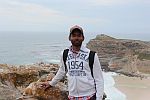GAM 2019 Blog
by Ramasamy Venugopal
- Published: Monday, April 15 2019 03:00
For those of us in astronomy, time travel is an everyday reality. Our telescopes constantly look to the sky and to the past, searching for clues to understand the universe. 2019 is a year of many milestones in astronomy, a good point to take pause and see where we are and how far we have come.
A hundred years ago, a handful of countries came together towards the end of a destructive global war to formally establish the International Astronomical Union (IAU). Almost a century later, the whole world joined together to celebrate astronomy during the UNESCO International Year of Astronomy (IYA) in 2009. In 2019, the global community is coming together again for the IAU100 anniversary and to recognize the myriad contributions of astronomy in the past hundred years. While the field of astronomy has undergone a "sea changes" and changed the world around us, what endures is its ability to connect humanity and help us see our connections to the rest of the universe. It is very appropriate that the theme of IAU100 is “Under One Sky”. It highlights one of the biggest strengths of astronomy and its distinctiveness among other fields of science and technology. It also echoes the motto of Astronomers Without Borders: “One People, One Sky” and the spirit of Global Astronomy Month (GAM).
2019 marks a decade since the first IAU strategic plan which led to the creation of the Office of Astronomy for Development (OAD). The OAD is one of the offices of the IAU, the others being the Office for Astronomy Outreach (OAO), Office for Young Astronomers (OYA), and the upcoming Office of Astronomy for Education (OAE). Although the primary objective of the IAU is “to promote and safeguard the science of astronomy,” these offices are a testament to the role of astronomy in aspects such as, education/capacity building, outreach, and development.
For the OAD, this April will see the completion of eight years of operations. During this time, the idea of using astronomy for development has evolved and improved as we learned and worked with the global astronomy community. Our community of projects, majority of which are run on a volunteer basis by coordinators around the globe, has impacted on more than half of the 17 Sustainable Development Goals (SDG). Recent examples include an astronomy program at a STEM school for girls in South Africa, an astronomy diplomacy project bridging groups in a post-conflict environment, educational projects targeting indigenous populations in Canada, Brazil, and refugee children in Nigeria and Algeria, inclusion/tactile astronomy projects in Indonesia, Malaysia, Ireland, Philippines, and several Latin American countries. This bottom-up approach allows anyone to use astronomy to make a positive change in society. Funding can be applied for through our annual call for proposals. The next application cycle will be announced in mid-April 2019. More information at http://www.astro4dev.org/cfp/.
The OAD also realizes the value of engaging with relevant stakeholders from other fields of science and technology. While we embrace our community and celebrate our achievements, we need to look beyond astronomy if we are truly to be “One People, One Sky”.
Useful links:
IAU: https://iau.org/
IAU100 anniversary: https://iau-100.org
OAD: http://www.astro4dev.org/
Regional Offices: http://www.astro4dev.org/regions/
OAO: https://www.iau.org/public/
OYA: https://www.iau.org/education/office_for_young_astronomers/
OAE: https://www.iau.org/education/oae/
| Ramasamy Venugopal works for the Office of Astronomy for Development, a partnership of the International Astronomical Union and the South African National Research Foundation. He is the operations manager in charge of managing the OAD Call for Proposals and the projects funded by the office. He is also an active member of the Space Generation Advisory Council, a youth organization that represents university students and young space professionals to the United Nations, space agencies, industry, and academia. |  |






